Scholarships and Student Support
Student Support Awards for Faculty Fellows
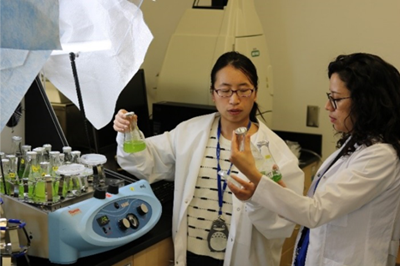 DWFI leverages Robert B. Daugherty Foundation grant funds and additional donor funds to support graduate student research led by DWFI Faculty Fellows. Since 2014 the program has funded 59 projects. Growing over the years to approximately half a million dollars annually, this is DWFI’s largest program area. These competitive awards target research that is scalable and synergistic (can be applied in multiple contexts or environments), builds off past or current research, and enables future insights. The award amount of $17,500 must be matched one-to-one with faculty funds, ensuring a student can be supported full-time through a master’s or PhD program. The research outcomes of these awards are highlighted in an annual Research Forum at the end of the Spring semester and new applications are accepted each year.
DWFI leverages Robert B. Daugherty Foundation grant funds and additional donor funds to support graduate student research led by DWFI Faculty Fellows. Since 2014 the program has funded 59 projects. Growing over the years to approximately half a million dollars annually, this is DWFI’s largest program area. These competitive awards target research that is scalable and synergistic (can be applied in multiple contexts or environments), builds off past or current research, and enables future insights. The award amount of $17,500 must be matched one-to-one with faculty funds, ensuring a student can be supported full-time through a master’s or PhD program. The research outcomes of these awards are highlighted in an annual Research Forum at the end of the Spring semester and new applications are accepted each year. Ivanhoe Scholarship Fund
The Ivanhoe Foundation of Ojai, California, made a generous gift to support international graduate students at the University of Nebraska who are preparing for careers in water management. The gift creates new awards for fellowships and research assistance to help students committed to improving water and food security in developing countries. This funding will strengthen and enhance DWFI’s efforts to cultivate future leaders in water and food security. Graduate students working with DWFI Faculty Fellows are eligible to receive this award. Ivanhoe Scholarship recipients will be selected from applicants to the Student Support Award program, described above.Robert and Karla Baltzell Student Innovator Fund
Generous support from the Baltzell Fund is available for University of Nebraska undergraduate and graduate students undertaking research in the area of livestock, animal feed, and/or crops and their intersection with water use. Students must work with a DWFI Faculty Fellow and commit to 5-10 hours of research per week. For more information, contact Rachael Herpel at DWFI, 402-472-4977 or Melissa Sailors at CASNR, 402-472-7890.Water Advanced Research and Innovation (WARI) Fellowship
The WARI Fellowship Program is a transformative program for students pursuing advanced academic research or other water-related careers. The program provides opportunities for exceptional students and scientists from India to gain exposure and access to world-class research facilities at the University of Nebraska-Lincoln. The WARI program promotes research and capacity building in the area of water; encourages and motivates outstanding students to take up research as a career path; and paves the way for the next generation of Indian scientists to interact with American peers and build long-term research and development collaborations. WARI internships last between three and six months and fellowships are 12 months long. See more information.Internship Opportunities
DWFI provides paid internships, training and professional development to high-achieving undergraduate and graduate students. Year-round opportunities exist in the areas of research, policy, field work, and laboratory analysis. Students may work with DWFI, the Nebraska Water Center, or the Water Sciences Laboratory during their internship. Applications are accepted on a ongoing basis.Re-occurring Events and Opportunities
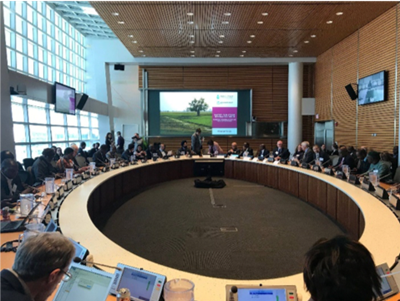 Water for Food Global Conference
Water for Food Global Conference
The Water for Food Global Conference is the institute’s signature educational and networking event, held each year at the Nebraska Innovation Campus Conference Center in Lincoln, Nebraska. The conference attracts respected experts; governmental and non-governmental organizations; academic researchers and students; farmers and farm suppliers; donors; and private industry leaders from many countries around the world. Attendees share best practices, new technology, research and other developments in achieving sustainable water and food security. Explore past conference resources.Nebraska Water Center Fall Symposium
The annual two-day symposium focuses on Nebraska water issues and perspectives, but also addresses state and federal water viewpoints through presentations by policymakers; producers; water managers; academics; non-governmental organizations; and consultants. The event also features a graduate student poster competition open to students from any higher education institution enrolled in a water science or policy program. Explore past symposiums.Nebraska Water Center Spring Seminar Series
This multi-week lectures series is free and open to the public. The Spring Seminars provided a forum to increase awareness of water issues and engage in thoughtful discussion surrounding the wise management of Nebraska's surface and groundwater resources. The series began in 1968 as a spring semester program for students, faculty, water professionals and the public to hear experts address current water issues. Students can take the seminar series for one hour of credit through SNR and other UNL departments. Events are held First Floor Auditorium at Hardin Hall located at the northeast corner of 33rd and Holdrege streets on UNL’s East Campus. The 2018 theme is Natural Resource District (NRD) Priorities and Challenges. Explore the Spring Water Seminar Series.Nebraska Water and Natural Resources Tour (every summer)
The annual tour focuses on current events, challenges, and opportunities regarding Nebraska and regional water and natural resources. Participants go to the source of an issue, talk with the people involved and gain a holistic understanding of current management challenges. Tour participants include producers; state and federal agency employees; elected officials or their representatives; Natural Resources Districts and Irrigation District board members; agricultural industry representatives; students or academics; and the public.Field Irrigation Course
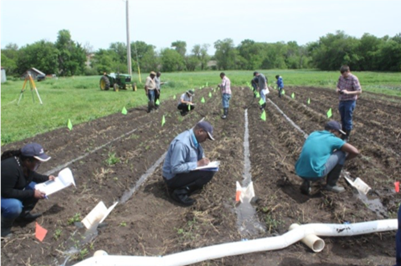 Every other summer, DWFI organizes an intensive two-week, hands-on field course in Nebraska for graduate students. Students learn measurement and analysis for flow in open channels and pipelines; pumping systems; surface, sprinkler, and drip irrigation systems; well and pipeline hydraulics; and soil water properties. Field trips are included in the course curriculum and all students are preparing for Masters of Science projects/research. The course was designed for graduate students in the Land and Water Development for Food Security Masters of Science program at IHE-Delft and at the University of Nebraska, but others may request to participate by emailing DWFI Faculty Fellow Derek Heeren. Requests are evaluated on an individual basis. The target audience includes graduate students in developing countries with water and food challenges and water or agricultural ministries and consulting groups that employ graduates.
Every other summer, DWFI organizes an intensive two-week, hands-on field course in Nebraska for graduate students. Students learn measurement and analysis for flow in open channels and pipelines; pumping systems; surface, sprinkler, and drip irrigation systems; well and pipeline hydraulics; and soil water properties. Field trips are included in the course curriculum and all students are preparing for Masters of Science projects/research. The course was designed for graduate students in the Land and Water Development for Food Security Masters of Science program at IHE-Delft and at the University of Nebraska, but others may request to participate by emailing DWFI Faculty Fellow Derek Heeren. Requests are evaluated on an individual basis. The target audience includes graduate students in developing countries with water and food challenges and water or agricultural ministries and consulting groups that employ graduates. IHE-Delft/UNL Double Degree Program
IHE-Delft and the University of Nebraska/DWFI have combined the strengths and expertise of both universities to create a double master’s degree in developing countries with water and food challenges. The program emphasizes water resource identification and development; water allocation and distribution; food production; plant-water interactions; and maximizing crop yield while minimizing water usage. Students spend 20 months in Nebraska and the Netherlands. Motivated professionals seeking leadership roles in water/agricultural ministries, consulting, or academia are candidates for the program. The application period opens every two years. See the program impacts.International Scholar Short Course
Every summer, DWFI hosts an intensive, week-long course emphasizing the role and variety of public and private decision-makers in driving technology adoption, governance, investment, and infrastructure for agricultural production. Additional emphasis is placed on the importance and management of water resources as well as the current state of agricultural entrepreneurship in the High Plains region. Students spend time learning in the field and interacting with key participants in the agricultural innovation process along the supply chain. The course is designed for undergraduate students in the UNL CUSP program. However, additional spots may be available on a case-by-case basis by contacting Kate Gibson, Policy Project Manager.For the latest updates on education activities, see our News and Events.
On-Demand Workshops
Through our extensive network of staff, Faculty Fellows, and collaborators, DWFI has the capacity to organize workshops upon request. The date, location, and duration of these workshops is established based on stakeholder needs. A range of educational opportunities is identified below, representing a variety of research targeted towards our five focus areas. These training programs may be taken individually or in combination. This list is intended to start a planning discussion between interested parties and DWFI leadership.
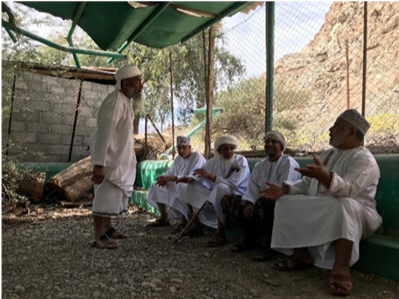 Water Productivity and Yield Gap Analysis
Water Productivity and Yield Gap Analysis
- Utilize the Yield Gap and Water Productivity Atlas to identify areas with greatest potential for crop intensification and assess national food self-sufficiency and scenarios of crop production and land use.
- Learn methodologies from the University of Nebraska to calculate water productivity for multiple crop and livestock products that may be applied globally.
- Identify reasonable water productivity goals based on specific soil and climatic areas.
Regional Evapo-Transpiration and Water Balance Assessments
- Learn to use the GloDET data portal and the PyDisALEXI software to calculate daily evapo-transpiration (ET) at 30-meter resolution.
- Then, learn how to use ET data to determine plant water stress (a drought indicator), field scale water productivity and crop yield estimates, and water availability in watersheds and river basins.
Drought Vulnerability Assessment Training & Regional Drought Management Systems
- Empower decision-makers to plan for and manage the impacts of droughts on food and water security under current and future climate conditions.
- Use the GloDET data portal to assess drought risk.
- Learn best techniques for conducting needs and opportunity analysis, implementing a drought monitoring system, and conducting vulnerability and impact assessments.
- Experts from DWFI and the National Drought Mitigation Center (NDMC) will facilitate the stakeholder involvement and planning process.
Nebraska Groundwater Management Tour
- Learn the Nebraska model of effective groundwater governance at the local level through Natural Resources Districts.
- See how state and local governments interact to regulate hydrologically-connected surface and groundwater.
- Identify best management practices for monitoring, modeling, and regulating groundwater.
- Understand factors influencing farmers’ decisions regarding how to use groundwater, and how to promote entrepreneurship and innovation.
From Land Surface to the Aquifer: Vadose Zone and Recharge Monitoring
- Gain insight into the physical and chemical properties of the vadose zone – the unsaturated area between the land surface and groundwater table – through the Nebraska Vadose Zone Database.
- Understand how contaminants are transported within the vadose zone and affect groundwater supply.Learn best management and monitoring practices.
Crop Modeling for Nutrient, Irrigation, and Yield Management
- Learn proprietary crop modeling software, such as the Hybrid-Maize model, from the developer, DWFI Faculty Fellow Haishun Yang.
- Simulate crop growth and yield based on resource input, such as water and fertilizer.
- Schedule irrigation and fertilizer applications based on optimizing target yields and costs.
Smart Water Meters for Water and Energy Efficiency
- Explore reasons for high variability in energy efficiency at a well level by implementing smart water and energy meters.
- Better understand the cost and efficiency of groundwater pumping and how individual producer costs compare to an anonymized peer group.
- Target opportunities for energy and water conservation improvements, as well as improve peak load management and energy policy design.
Variable Rate Irrigation Operation and Training
- Utilize the latest technology, including software and hardware, to create variable rate irrigation prescription maps to conserve water from center pivot irrigation while maintaining high yields.
- Incorporate satellite-based remote sensing of ET, imagery from unmanned aerial vehicle (UAV) flights, and ArcGIS software into a field experience.
Support for Smallholder Irrigated Agriculture in Developing Countries - Learn strategies from University of Nebraska irrigation experts to identify and support viable business models, improve agricultural production systems and water
- Identify the best lifting devices (pumps), irrigation schemes, and water application technologies for your case, and progress through the implementation steps, such as these steps for shared center pivot irrigation.
AquaCrop-OS Training
- Receive hands-on training from the developers of AquaCrop-OS, a free, open-source version of AquaCrop, a crop water productivity model developed by the Food and
- AquaCrop simulates yield response to water for multiple crop types and environmental conditions and is designed specifically for regions where water is a critical limiting factor in crop production.
- AquaCrop is intended for use by both scientists and practitioners, and requires minimal data inputs in comparison with most other crop models.
- Learn practical strategies to implement water markets, including transaction costs; mechanisms to build trust; monitoring; verification; governance requirements; and level of formality.
- Understand how to incorporate realistic hydrologic or biophysical processes and benefit from real world case studies.
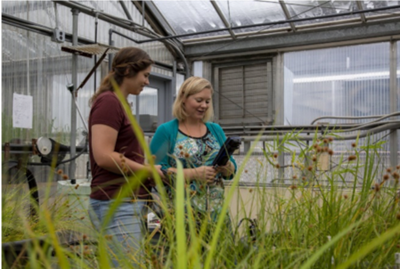 Water Re-Use in Food Processing
Water Re-Use in Food Processing
- Receive expert analysis and training to identify points within the crop, dairy, or livestock processing system where water reuse is possible, regardless of your level of technology.
- Water quality is considered, and tests are taught as needed, to ensure water reuse is sanitary and safe.
Floating Wetland Treatment
- Tour the East Campus MesoLab, under the direction of DWFI Faculty Fellow Tiffany Messer, to learn best management practices to treat non-point source pollution in surface water.
Customized Workshops
Customized Workshops
Beyond the opportunities described above, DWFI is able to customize workshops based on your unique needs. We can create tours and workshops specifically for you, within the entire range of topics and expertise of our Institute staff, Faculty Fellows, Global Fellows, and partner organizations. Trainings may be held in Nebraska, the United States, or in the home country of the workshop participants.
For more information, contact us at waterforfood@nebraska.edu.
COOKIE USAGE:
The University of Nebraska System uses cookies to give you the best online experience. By clicking "I Agree" and/or continuing to use this website without adjusting your browser settings, you accept the use of cookies.

